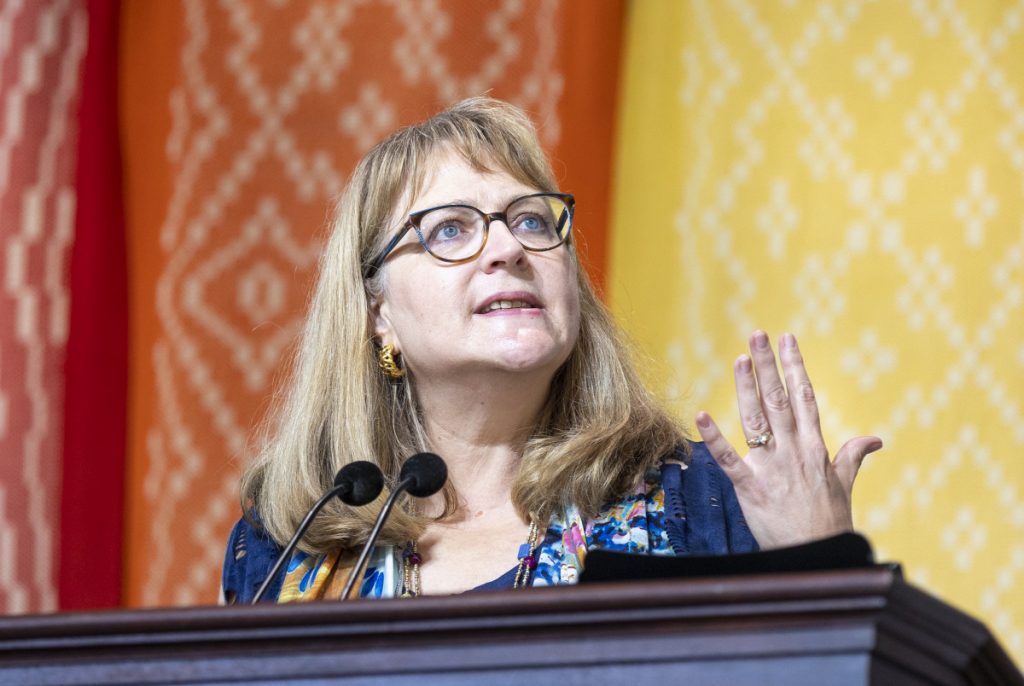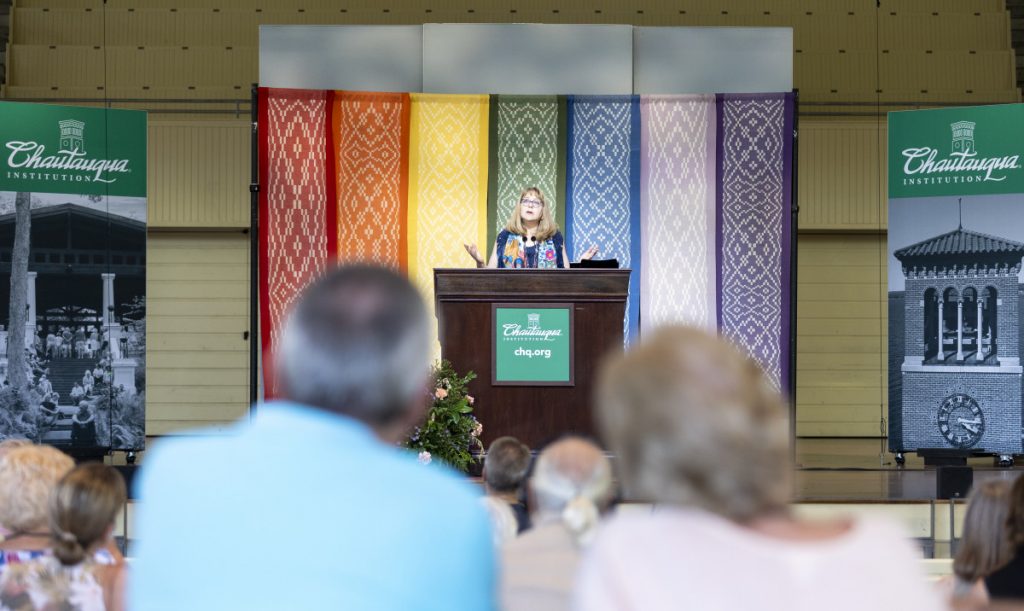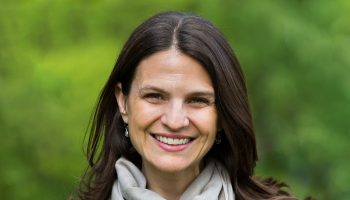MAX ZAMBRANO – STAFF WRITER

Sifan Hassan began her first heat in the 1,500-meter race at the Tokyo Olympics with a tumble. The Ethiopian-born Dutch runner was expected to win the gold medal for the entire event, and within a moment of her first race was on the ground.
She got up, and she ran for her life. Breezing past racer after racer, she overtook the lead, and won the race. That night, she earned gold in the 5,000 meter final. She eventually won gold in the 10,000 meter, too, and bronze in the 1,500.
“For a woman who fell in her first race,” said Diana Butler Bass, who told this story to open the final Interfaith Lecture Series of the 2021 season.
Bass, an author, speaker and preacher, presented her lecture, titled “Get Up and Go On — Together,” at 1 p.m. Wednesday, Aug. 25 in the Amphitheater, bringing more heat to an end-of-summer heat wave. It was also the final Interfaith Lecture for Week Nine, themed “Resilience.”
Bass’ most recent book is Freeing Jesus: Rediscovering Jesus as Friend, Teacher, Savior, Lord, Way, and Presence, and she’s won awards for several of her other 10 books, including Grateful: The Transformative Power of Giving Thanks and Grounded: Finding God in the World.
She often thinks of stories like Hassan’s when she thinks of the word resilience — unbelievable stories of achievement, stories against the odds. But, she admitted, there are other versions of resilience, too.
“Resilience isn’t just grit and athletic superiority and making the best of a terrible situation, of bouncing back to win the gold medal,” she said.
One different image comes from “The Trough,” a poem by Judy Brown. In it, a person is caught in ocean waves. They know if they fight against the current, they will strain themselves and certainly drown. But, if they conserve energy and let the flow take them, it will take them to another place on land.
“That is resilience, as well,” she said. “It’s a different kind than pulling yourself up and running on and displaying grit. In this poem, you’re employing knowledge, you understand the situation you are in and you know that if you fight you’re not going to make it. So, getting out of this situation means going with the flow until everything changes.”
In another image, Bass revisited one of her favorite stories, from Luke Chapter 4 in the New Testament. Jesus is at the beginning of his ministry and is invited to read a scroll to a synagogue on the sabbath.
“He gets up, and he reads the wonderful words about how the captives are being set free, that liberation is coming to the oppressed, and then as he finishes it he sits down and says, ‘Today, the scripture has been fulfilled in your hearing,’ ” Bass said.
Jesus’ neighbors didn’t appreciate this, she said. A violent mob threatened to throw him off a cliff at the edge of town. Anyone who doesn’t know the story might wonder how Jesus will survive this situation, she said.
“The text simply says, ‘Jesus passed through the midst of them and went on his way,’ ” she said. “He left!”
Some people might argue that he is Jesus and worked a miracle to part the crowd, like Moses parting the Red Sea, she said. But Bass believes he simply walked away.
“It shows this idea of leaving when you’re rejected or when there is a threat,” she said.
A few chapters later, in Luke Chapter 9, Jesus commissioned his disciples to go out and spread the same news he shared in the synagogue. If people were not receptive, Jesus told them to “shake the dust off of your feet as you leave town,” Bass said.
Knowing you can’t win, are in an unchangeable situation, are not welcome and that you could be hurt, and opting to leave is a form of resilience, she said.
Bass’ March 2021 book, Freeing Jesus, is a memoir of her own experience with Jesus and of spiritual resilience, she said. Chapter 5 of the book is one she never wanted to write. Bass was in her early 30s and said she had taken the wrong path in life.
“As a young woman, I was afraid of chaos and disorder, and I so wanted to be accepted, and I so wanted to please all the male authorities around me that I embraced an incredibly rigid, conservative form of neo-Calvinism,” she said.
She described herself as judgmental, certain she was always right and righteous, and easily condemned others.
“I found myself becoming the sort of person you wouldn’t want to be around,” she said.
Eventually, she realized what she was doing, but she had no idea how to stop walking down that path.
“I didn’t know what to do,” she said. “Except, it became increasingly clear that I needed to turn around and go the other way.”
Turning around is an incredibly difficult experience, she said, full of admitting her wrongs over and over again. At 32 years old, she was newly divorced and unemployed — released from her first academic job at an evangelical college. It was Thanksgiving, and Bass was alone, as she was also distant from her parents. She sat down on the concrete floor of her garage-turned-apartment, and she cried.
“I had no company,” she said. “No feast. No table to share. No one who would care if I died.”
Then, she heard a voice, from John 14:31.

“I will not leave you orphaned,” she read. “I am coming to you. Do not let your heart be troubled, and do not be afraid. Rise up. Let us be on our way.”
Bass’ resilience speaks to reaching an end, admitting mistakes, and starting over from scratch, she said. She presented these examples because she thinks people have too narrow a definition for the word “resilience.”
“I hope they’ve invited you into thinking about your own stories of resilience, because there isn’t really a single definition of resilience,” she said. “There is not only one way of resilience.”
Bass is more concerned with answering the question: Which path of resilience is called for at any given time? Two spiritual practices can help answer it, she said.
The first practice is discernment, or the capacity to understand the moment one is in, she said.
Quakers, she said, have group practices where they try to answer where they are right now.
“Discernment gives us that ability to be able to read the moments of our lives, and if we read the moments of our lives then perhaps we can figure out which path of resilience is best,” she said. “You might need others to help you there.”
The second practice is wisdom, something that people may not see as a practice but something that people acquire through age and experience, she said.
“Wisdom emerges from bringing other moments to bear on the current moment,” she said. “Wisdom entails knowing the answer to this question: Where have I been?”
Wisdom can also answer which moments of life contributed to understanding one’s self and one’s community, she said.
Referencing Colum McCann’s Interfaith Lecture on Tuesday, Bass said these questions are about knowing one’s story.
“Our lives are resilience,” she said. “Our capacity to know which path of recovery to take is dependent upon the stories we have already written.”
She then shared a few stories.
First was a personal story of an 18-year-old she met at the Wild Goose Festival in Hot Springs, North Carolina, one of Bass’ favorite places to visit in the summer — along with Chautauqua.
The woman ran into Bass outside of the green room. She was shaking, holding a copy of Bass’ book A People’s History of Christianity, and she asked Bass to sign it.
Bass happily agreed, and asked her where was from.
“She was from a town of 300 people in the very buckle of the Bible belt,” Bass said.
The woman saved every cent she made from her after-school job so she could take a bus halfway across the country to this festival. It was the first time she ever left her town, a place where everyone believes the exact same way — questions are forbidden, Bass said.
“She said, ‘I had to see if you were real,’ ” Bass said. “I assured her I was very real. I asked her what she was going to do, and she said, ‘Well, I guess I’ll just go back home. But it won’t be the same.’ ”
Bass remembers this story every time she thinks of complaining about her church. She remembers that woman who sacrificed her savings to ask about her own faith.
“That is heroism of the everyday,” she said. “That is resilience that doesn’t make it on the evening news.”
Everyone has a personal story of resilience, ranging from illness to surviving genuine threats, she said. Each one creates a life of resilience and the capacity for one to practice wisdom, she said, and when one faces a tough task again, they can call on that wisdom.
Bass then turned to history, specifically the Spanish influenza pandemic a century ago. Her husband’s grandparents were young with two children when they all were infected. Both of their children died, Bass said.
When the flu receded in the early 1920s, they grieved over the loss of half their family. They agreed, however, to try again, not knowing if the same disease might return and steal from them once more.
Among the new family was her husband’s mother. If her parents never tried again, Bass’ husband would have never been born, she said, nor Bass’ own daughter.
“That’s what history does for us — it gives a sense of wisdom and resilience where we can look back and say, ‘Yes, that was horrible, and look at what happened as a result of it,’ ” she said.
Both well-known history and personal history show humans’ resilience, she said.
Faith stories, too, demonstrate resilience, she said. She referenced Hagar going into the desert with her son, trusting God would help them find something; Israel wandering in the wilderness; and several stories of people in exile fearing everything was at an end, for examples.
“Muslim, Jewish and Christian traditions are stories about resilience, except we usually don’t call them that. We usually call them faith,” she said. “We can talk about resilience in medical terms and in terms of spiritual practice, in terms of storytelling and all kinds of terms that make sense in our secular world. But ultimately, it leads us back to the simplest and most profound thing: resilience.”
Resilience makes Bass think of two words: hope and love. She said her husband’s grandparents are a story of hope.
“Hope separates itself from resilience just a little bit by saying, ‘You’re not going to get back what you had, but there’s still a possibility of joy, of life, of true change, of overcoming what brought you to this place in the very beginning.’ ”
Resilience also teaches people to love themselves in the same way God loves people, she said.
“Resilience involves loving others,” she said. “To be able to reach out and pull others up when they can’t get up for themselves, to be there to listen and hopefully have someone who will listen when we need those ears, when we need that community to say, ‘Keep going. Keep going. Keep going.’ ”
It also can allow people to spread enough compassion so nobody has to suffer the same thing again, she said.
“That’s the best I can help you with this week,” she said. “As Chautauqua comes to an end for this year — this terribly, truly awful year — the end of it is faith, hope and love abide. And the greatest of these is love.”




